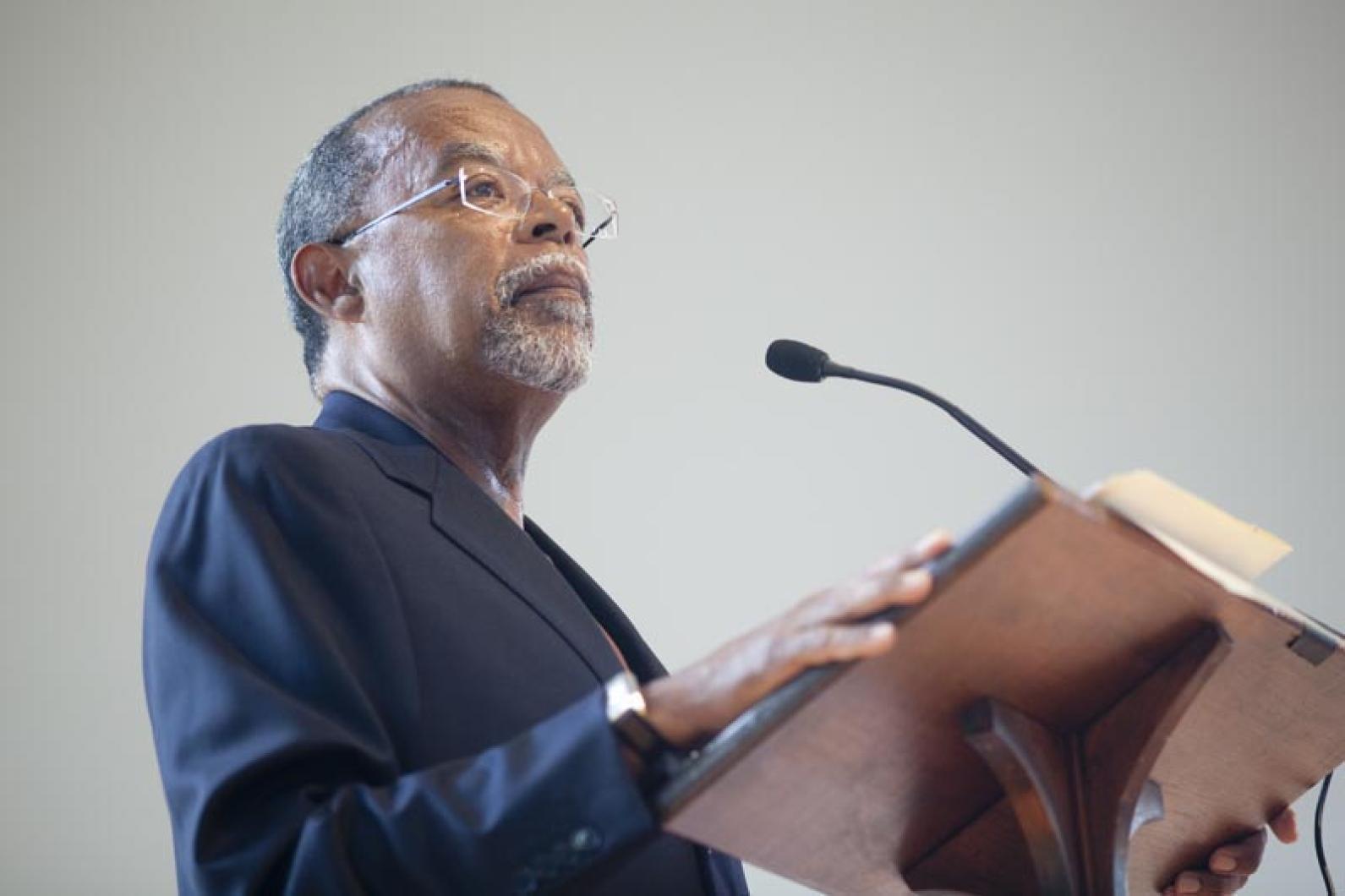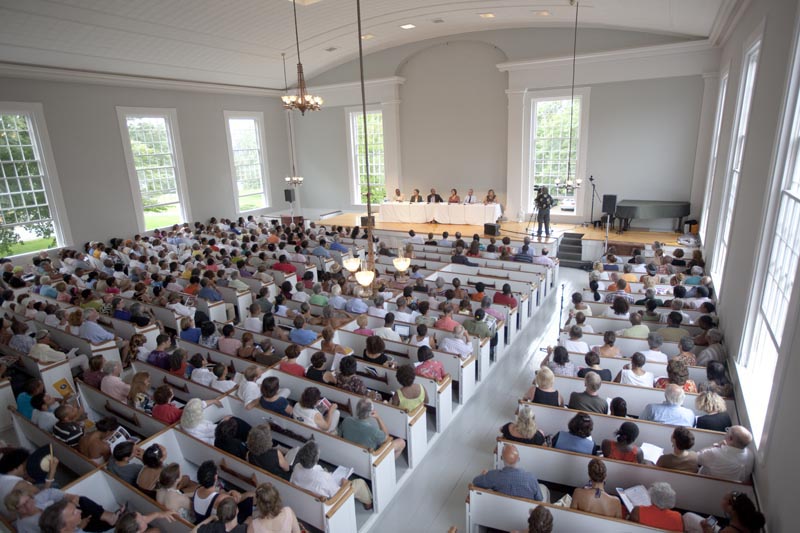Nodding to Professor Henry Louis (Skip) Gates Jr. at his Whaling Church panel discussion Achieving Equality in the Age of Obama last night, Princeton professor Melissa Harris-Lacewell shook her head and said: ”If you had told me this time last year, when we were all pretty emotionally up and excited, even though George W. Bush was still our President, that we would actually feel worse a year later, when Barack Obama was our President, about questions of race in America, I would have told you you were lying.”
Yet Mr. Gates acknowledged his part in bringing down the mood nationwide when he began by recounting his “bizarre” arrest at his Cambridge home; first getting the handcuffs moved from his back to front, then rolling down the window of the police cruiser and calling out to his secretary, “Call Tree,” meaning lawyer and Harvard colleague Charles Ogletree. He thanked many in the audience for their support, including for helping him get off the Vineyard for that White House beer though fog had grounded the planes. “How bad would that have been? Officer James Crowley had been there and we’d been up here at the Inkwell, sipping chardonnay, covered by Fox News. That was not going to be too good.”
But he acknowledged that his Ivy League connections worked for him at the jail. “This isn’t about me. I was in jail for a total of four hours . . . what about the people in jail for four days, or four months, or four years? It’s about fairness under the law, race-neutral application of the law.
“There are one million black men in jail or prison and on July 16 this summer I became one of them . . . what about all those men and women who languish unfairly in prison every day, who are racially profiled every day, who have no recourse, no hope of salvation no way to break that cycle?
“I hope to use my experience to work to address the overwhelming problem of the massive number of African Americans who are hopelessly caught in the web of the criminal justice system, a disastrous problem that is destroying the very fabric of our community.”
Panelist Lawrence Bobo, another Harvard professor, had the numbers: one in 100 Americans are behind bars, one in 15 African Americans; or one in nine black men between the ages of 20 and 34. Next to him, Stanford professor Linda Darling-Hammond noted that the United States had five per cent of the world’s population, but 25 per cent of the world’s prison population.
Most of these were nonviolent criminals, Mr. Bobo said. Arbitrary disorderly conduct charges — the initial, later dropped, charge against Mr. Gates — was part of the reason, as was drug use. Professor Bobo acknowledged NAACP president Ben Jealous, present in the crowd, for campaigning to turn “tough on crime” policies to “smart on crime.”
Yet New York Times columnist Charles Blow, also on the panel, got a more tepid response when he said he should never have invited Officer Crowley to the White House rapprochement.
“You don’t get an invitation for fabrication,” he said. “That created in my mind an awful tableaux which was that not even a black President can get away with speaking out of turn against white authority, and [Officer Crowley] did not have to be contrite.
“To put it behind you, that to me was not the message of post-racial reconciliation that I needed from that situation,” Mr. Blow said.
Moderator Charlayne Hunter-Gault had asked each panelist about whether the election of Barack Obama made America post-racial; answers ranged from “I don’t know what that means,” to “no,” to “There ain’t nothing post-racial about the U.S.A.” — the last from Mr. Bobo who cited three Vineyard bumper stickers” I’ll show as much respect to your president as you showed mine,” “Had enough change yet?” and “Don’t blame me, I voted for the old white guy.”
Though an African American was in the Oval Office, black kids suffered dramatic inequality in educational opportunities, said Ms. Darling-Hammond; the difference between public school spending per child varied from $40,000 per year to $4,000 per year in “apartheid schools” with 90 per cent minorities who lacked textbooks, music or art classes and where there was a 50 per cent teacher turnover rate each year.
So, she said, the U.S. now ranked 35th out of 40 industrialized countries in math achievement, 31st in science and at the bottom tier in graduation rates. The U.S. had slipped from first to 16th in higher education. “Almost all of this comes from inequality,” said the woman who was head of the Obama transition team in education. Depressingly, she said the country had work to do to implement the 1896 Plessy (“separate but equal”) Supreme Court mandate in schools, let alone the integration required by Brown vs. Board of Education in 1954.
Panelist Claude Steele, the first African American to be provost at Columbia University, explained integration wasn’t the only problem. Black kids, he said, suffered “stereotype threat anxiety,” of knowing that others didn’t believe they could do it. But this could be remedied, he said, by teachers who gave the right critical feedback: saying it’s a very demanding task but affirming the child’s ability to achieve.
Ms. Harris-Lacewell, who said her sense of hopefulness was largely dashed, did take heart from President Obama’s election in what she called a referendum on white supremacy. (She explained the Republicans’ choice of Sarah Palin for vice president as “Obama has out-whited us on white elitism so we’re going to go for, like, the hunting whites.”)
On election day, she said, “As African Americans have stereotype threat anxiety in the classroom . . . that they will under perform in intellectual tasks, any white Americans felt stereotype threat about the voting booth . . . what if they went in there and accidentally voted for the white guy?”
The Obama campaign, she said, responded as Mr. Steele suggested teachers should: “Ah, this is a difficult task for you — but you can do it!
“And sure enough we saw white Americans over performed and Barack Obama got elected,” Ms. Harris-Lacewell said.
There was discussion of how to have personal conversations about race, but Ms. Darling-Hammond said, systemic changes were critical: “When you make the investment, you change the opportunity structure. [Some seem to be saying] social action is futile and it’s not.”
Ms. Harris-Lacewell said it was not about how we all talk it out, but about how the state applies power. “All of us could of course work on making sure we are the most upright, uprighteous, pants on, name their kid Jason instead of Jamal . . .” but it wouldn’t change the power structure.
To a crowd packed with the so-called black elite, she said: “For me, one of the most exquisite benefits of the stupid Skip Gates arrest in his home, is the lie that it gives to the notion that respectability will make you safe.”







Comments (9)
Comments
Comment policy »